Shows
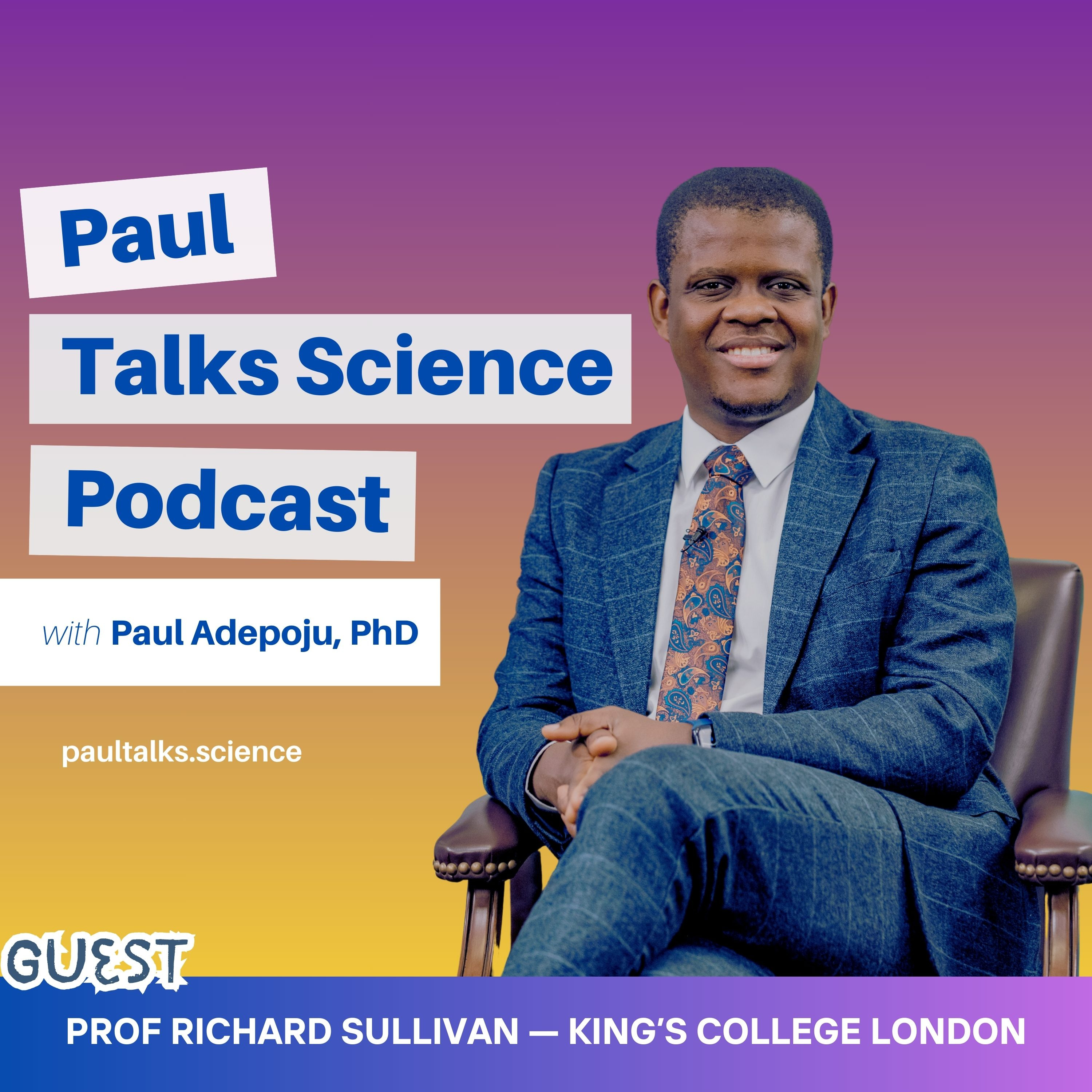
Paul Talks ScienceBuilding Cancer Systems that WorkSeason 3 kicks off with Professor Richard Sullivan (King’s College London) on why cancer outcomes depend less on shiny tech and more on end-to-end systems that actually work. We dig into affordability, widening inequalities, and why “reality-stratified” care beats one-size-fits-all blueprints. Richard unpacks adaptive HTA and health-benefit packages, the limits of screening without treatment pathways, the UK’s own pressure points, and what equitable cancer control looks like in rural, fragile, and conflict settings. We also talk financing—domestic resource mobilisation, the role of multilateral development banks, and why political commitment matters more than headlines.Host...
2025-09-2947 min
Paul Talks ScienceResistance, Regulation, and Reformulation: Malaria’s Next Scientific ChapterIn this episode of Paul Talks Science, Paul Adepoju sits down with Adam Aspinall, Senior Director of Access & Product Management at Medicines for Malaria Venture (MMV). They discuss the science and strategy behind a groundbreaking new malaria drug for newborns and young children — the first of its kind. From how scientists reformulated existing treatments to meet the needs of infants, to the global regulatory pathways that made rapid approval possible, this conversation sheds light on the innovation, policy, and persistence shaping the future of malaria control.
2025-08-1821 min
Deep DiveThe Hidden Threats Shaping Our Planet’s FutureIn this Deep Dive episode, we explore The Hidden Threats Shaping Our Planet’s Future through insights from the United Nations Environment Programme’s Frontiers 2025 report. From ancient microbes reawakened by melting ice, to rivers being restored by tearing down dams, to the challenges of protecting ageing populations and the dangers of toxic pollutants stirred up by floods — the report reveals emerging risks that could redefine the way we live on a warming planet. Paul Adepoju unpacks these findings, highlighting why they matter not just for policymakers and scientists, but for all of us navigating an uncertain environmental future.
2025-08-1822 min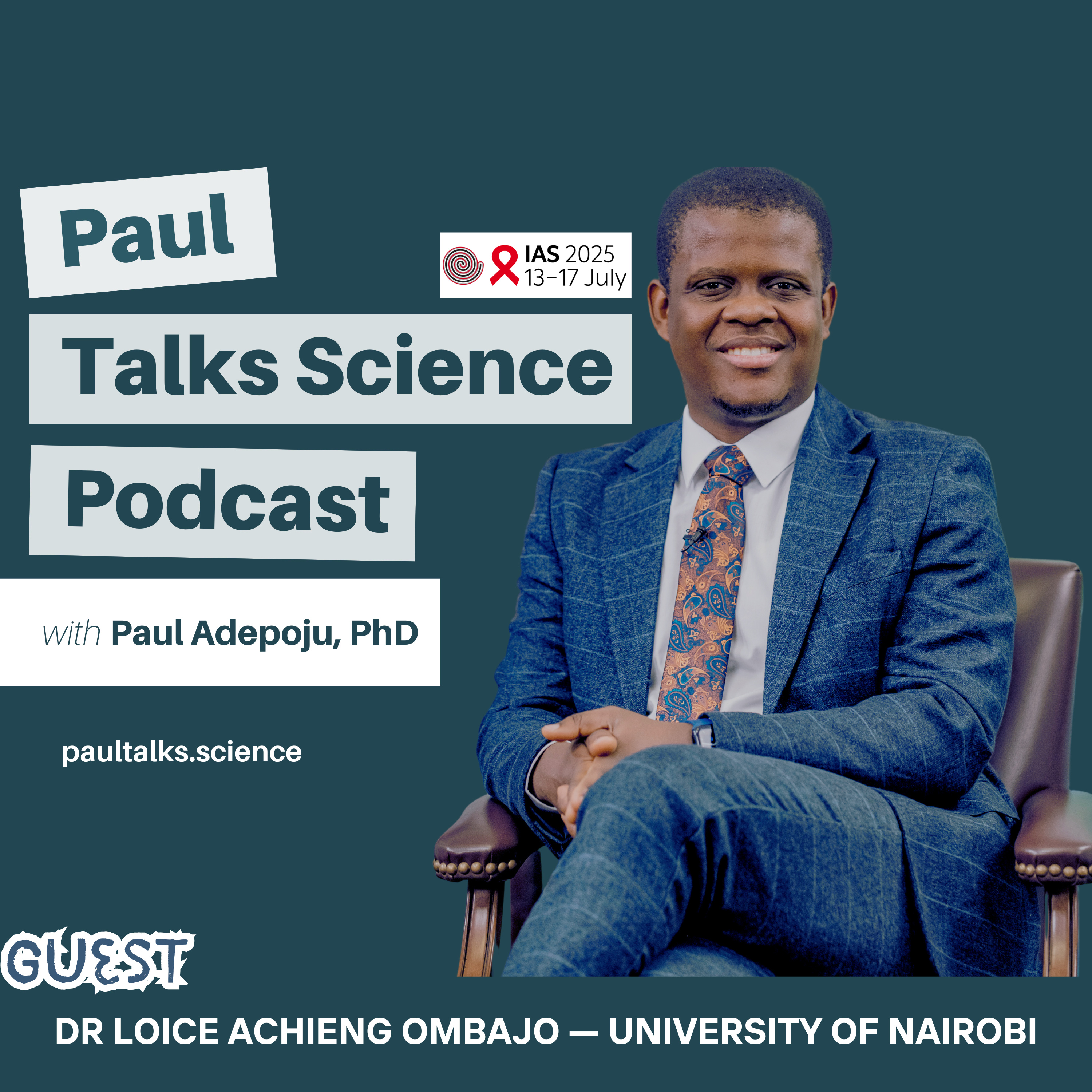
Paul Talks ScienceHIV Treatment and the Realities of Growing OlderAs people living with HIV live longer, a new challenge emerges: how do we adapt treatment for an ageing population?In this episode of Paul Talks Science, Paul Adepoju speaks with Dr Loice Achieng Ombajo of the Department of Clinical Medicine and Therapeutics at the University of Nairobi, about research shaping the future of HIV care for older adults. Drawing on findings from two studies, Dr Ombajo explores the shift from three-drug to two-drug regimens, the growing burden of comorbidities such as kidney disease, diabetes and cancer, and the implications of long-term antiretroviral use.The...
2025-07-2819 min
Paul Talks ScienceHow Economics Drives Safer ChemistryIn this special episode of Paul Talks Science—the first in a series recorded during my visit to the Toxics Use Reduction Institute (TURI) at the University of Massachusetts Lowell—I sit down with TURI Director Baskut Tuncak to unpack how economics is playing a pivotal role in driving safer chemical practices. We explore the Institute's origins, the real-world impact of the Toxics Use Reduction Act, and how businesses are shifting away from hazardous substances—not because they're forced to, but because it makes economic sense. Baskut also reflects on his global work as a UN Spe...
2025-07-0722 min
Paul Talks ScienceOxitec’s Mosquitoes and the Promise of Malaria ControlIn this episode, Paul spotlights Oxitec — the biotech company behind one of the most ambitious malaria control projects on the African continent. CEO Grey Frandsen joins Paul Talks Science to break down how Oxitec’s genetically modified mosquitoes are being deployed in Djibouti to target Anopheles stephensi, an invasive urban mosquito driving malaria resurgence in cities.They discuss how the technology works, why Djibouti is leading the way, and what it takes to scale lab-bred solutions into real-world impact. It's a story of science, strategy — and the promise of fighting malaria with mosquitoes.🧬 For the full stor...
2025-06-3035 min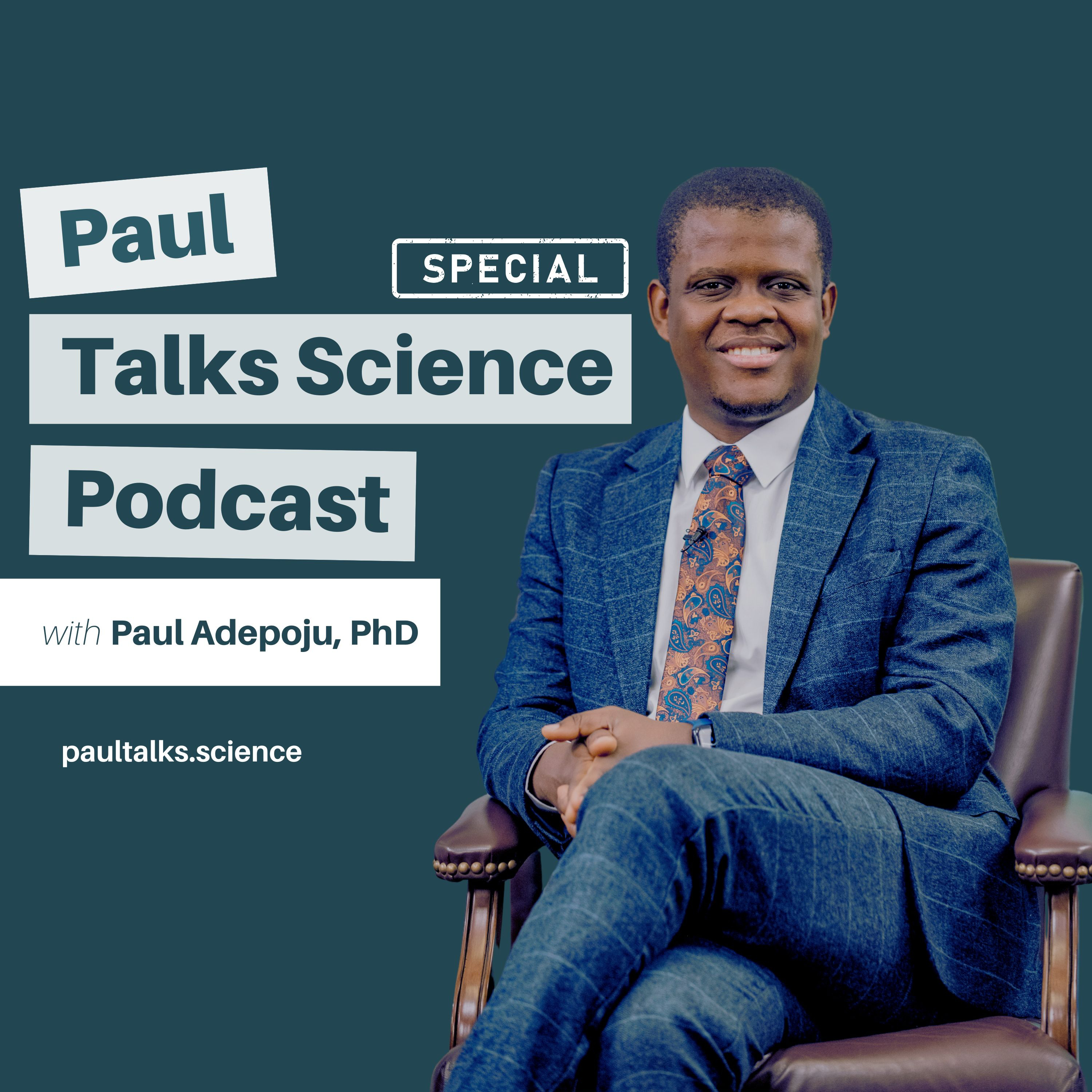
Paul Talks ScienceBattle of the MosquitoesWhat if the future of malaria control involves releasing more mosquitoes — not fewer?In this special feature episode, science journalist Paul Adepoju takes you deep into the high-stakes fight against a new urban malaria threat: Anopheles stephensi. From the labs of British biotech firm Oxitec to the malaria-stricken streets of Djibouti, and with insight from top global health experts like Dr. William Moss of Johns Hopkins, this narrative journey unpacks how genetically modified mosquitoes are being deployed to stop one of humanity’s oldest diseases.You’ll hear directly from:Colonel Abdoulilah Ahmed Abdi, leading...
2025-06-2316 min
Paul Talks ScienceWhat Genomics Reveals About MpoxMpox is surging again across parts of Africa — and this time, it seems like the world is paying even less attention. In this episode, I sit down with Ifeanyi Omah, a Wellcome Trust Doctoral Researcher in Hosts, Pathogens, and Global Health at the University of Edinburgh, to unpack the science behind the current outbreak.We discuss the evolving mpox landscape, including what genomic data is telling us (and what it isn’t), how human behavior and viral mutations intersect, why Sierra Leone has become a hotspot, and why building Africa’s capacity for outbreak response remains critical.🎧...
2025-06-1630 min
Paul Talks ScienceThe Politics of a Scan: Making Imaging a Global PriorityIn this episode of Paul Talks Science, I spoke with Prof. Hedvig Hricak, lead commissioner of The Lancet Oncology Commission on Medical Imaging and Nuclear Medicine, to discuss a historic win for global health: the newly adopted resolution at the 78th World Health Assembly that prioritizes access to medical imaging across low- and middle-income countries.We talk about how this resolution came to be, what it means for cancer and non-communicable disease care, and how innovations in artificial intelligence and affordable imaging technologies are reshaping the landscape. Prof. Hricak also reflects on the power of collaboration between...
2025-06-0220 min
Paul Talks ScienceTime 100 and Beyond: Christian Happi on Science, Strategy, and SovereigntyIn this episode of Paul Talks Science, Dr. Paul Adepoju sits down with Professor Christian Happi—molecular biologist, genomic trailblazer, and one of TIME’s 100 most influential people. From his pioneering work on Ebola and COVID-19 to his vision for translating African genomic data into diagnostics and therapeutics, Prof. Happi shares insights on what it takes to build sustainable science ecosystems in Africa.They delve into the challenges and opportunities in global health equity, the impact of shifting international research funding, and why local innovation and scientific sovereignty are no longer optional for the continent. This is a co...
2025-05-1935 min
Paul Talks ScienceFrom Donors to DIY Vaccines—Africa’s LeapIn this punchy Paul Talks Science episode, Africa CDC Director-General Dr Jean Kaseya lays out a game-changing vision: shift the continent from donor dependence to home-grown prevention. Hear how “Made-in-Africa” vaccines, a new primary-health-care push, and community-powered disease surveillance are rewiring public health—and why partners must align with Africa’s roadmap or step aside. A quick but eye-opening dive into the future of global health leadership.
2025-05-1503 min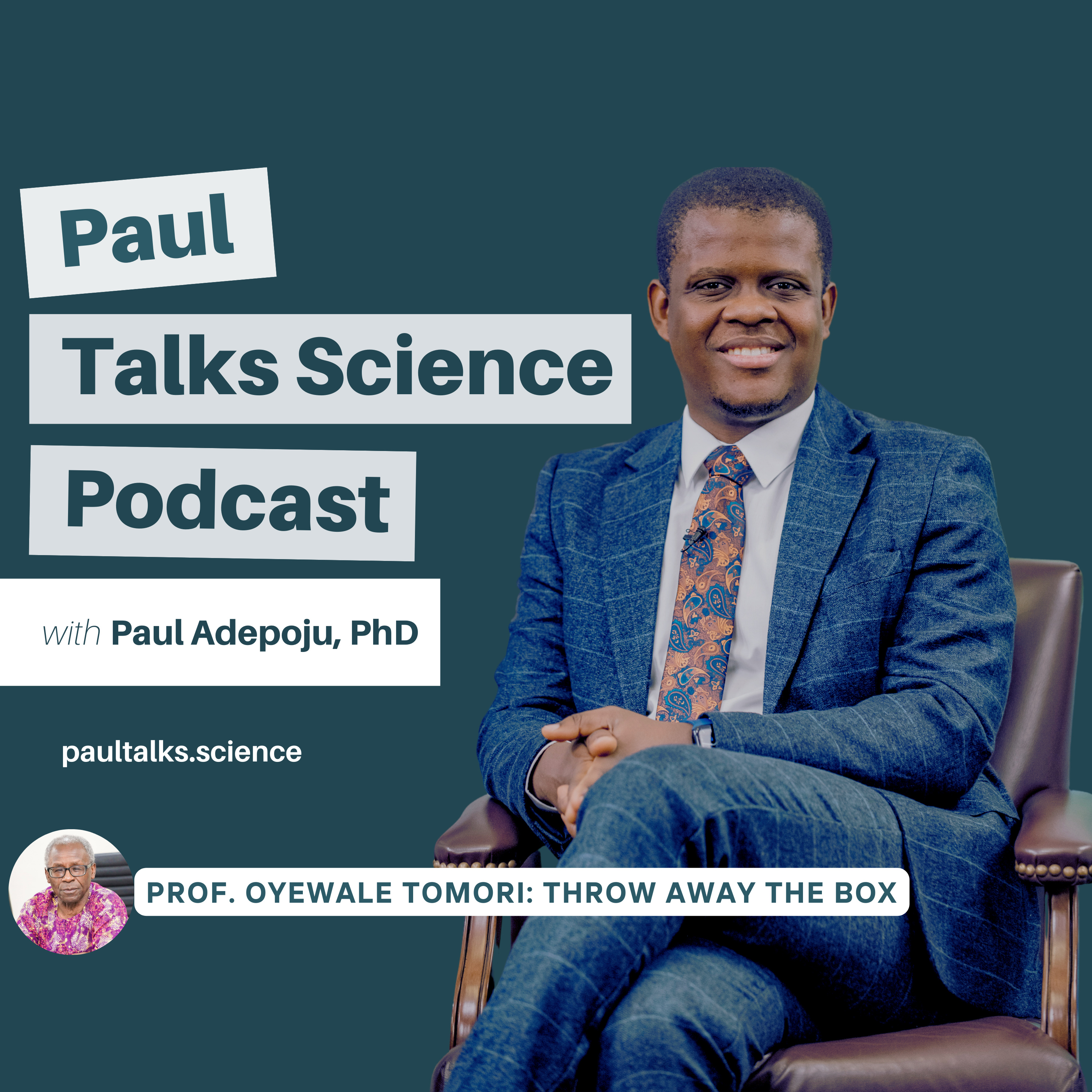
Paul Talks ScienceProf. Oyewale Tomori: Throw Away the BoxWhen U.S. funds abruptly dried up, Nigerian virologist Prof. Oyewale Tomori saw an unlikely gift: proof that Africa can—and must—stand on its own. In this episode, he tells host Paul Adepoju why the continent is “resource-wasteful, not resource-limited,” skewering billion-naira motorcades and idle PCR labs while village health officers lack even a bicycle. Linking to Paul’s Global Health Now feature “Mosquito Nets and Geopolitical Bets,” Tomori explains how a halted donor-funded supply chain threatens Nigeria’s malaria gains—yet also exposes the folly of outsourcing prevention to foreign budgets. His prescription? “Throw away the box a...
2025-05-1241 min
Paul Talks ScienceCell Counts and Bank Accounts: Mapping Cancer RiskWhile roving the abstracts stand at the World Cancer Congress in Geneva (17‑19 September 2024), Paul Adepoju bumps into Swiss TPH PhD researcher Peace Ayeni and ends up unpacking a jaw‑dropping data set of 4.1 million people living with HIV in South Africa. Her study shows that where you pick up your antiretrovirals—an affluent clinic or an under‑resourced township facility—can tilt the odds of getting a cancer diagnosis.In this episode, you’ll hear:How the team probabilistically linked national HIV‑lab records to build the SAM cohort, capturing cancers across the country.Why “cell counts and bank accoun...
2025-05-0509 min
Paul Talks ScienceThe Shrinking Malaria Map: Vaccines, Funding Shocks and Rising HorizonOn this World Malaria Day, host Paul Adepoju, PhD sits down with genomicist Dr Jane Carlton, Director of the Johns Hopkins Malaria Research Institute, for a candid look at how—and why—the global malaria map keeps shrinking even amid a sudden funding storm.From decoding Plasmodium genomes and deploying AI-powered diagnostics to rolling out the first WHO-approved vaccines and engineering “better” mosquitoes, Dr Carlton describes the science that’s turning elimination from dream to deadline. She also unpacks the immediate fallout of U.S. aid cuts—lost bed nets, dwindling rapid tests, and stalled fieldwork—and explains why l...
2025-04-2532 min
Paul Talks ScienceCigarettes, Scans & a Cancer‑Free FutureRecorded amid the buzz of the last World Cancer Congress in Geneva, this double‑feature episode of Paul Talks Science links global policy rooms to ground‑level clinic corridors—with one shared mission: stop cancer before it starts, and treat it smarter when it does.In the first half🗣️ Yannick Romero – Senior Knowledge & Advocacy Manager, Union for International Cancer Control (UICC)Twenty years of the WHO tobacco treaty in 10 minutes—wins, setbacks, and why a 10 % price hike can slash smoking rates by 5 %.How e‑cigarettes became Big Tobacco’s Trojan horse, and why Africa is the next b...
2025-04-2127 min
Paul Talks ScienceAfrica’s Maternal Health Paradox: 40% Drop, 70% CrisisAfrica has achieved a remarkable 40% reduction in maternal deaths since 2000—a significant milestone in global health. Yet paradoxically, the continent still accounts for a staggering 70% of maternal deaths worldwide. In this episode, Paul Adepoju speaks with Dr. Adeniyi Aderoba, WHO's lead on reproductive and maternal health for Africa, to unpack this complex paradox. They explore what's driving Africa's maternal mortality crisis, highlight innovative interventions making a difference, and discuss how political will, funding, and community empowerment are shaping the fight to save mothers’ lives. Tune in to discover why pregnancy in Africa should not...
2025-04-0844 min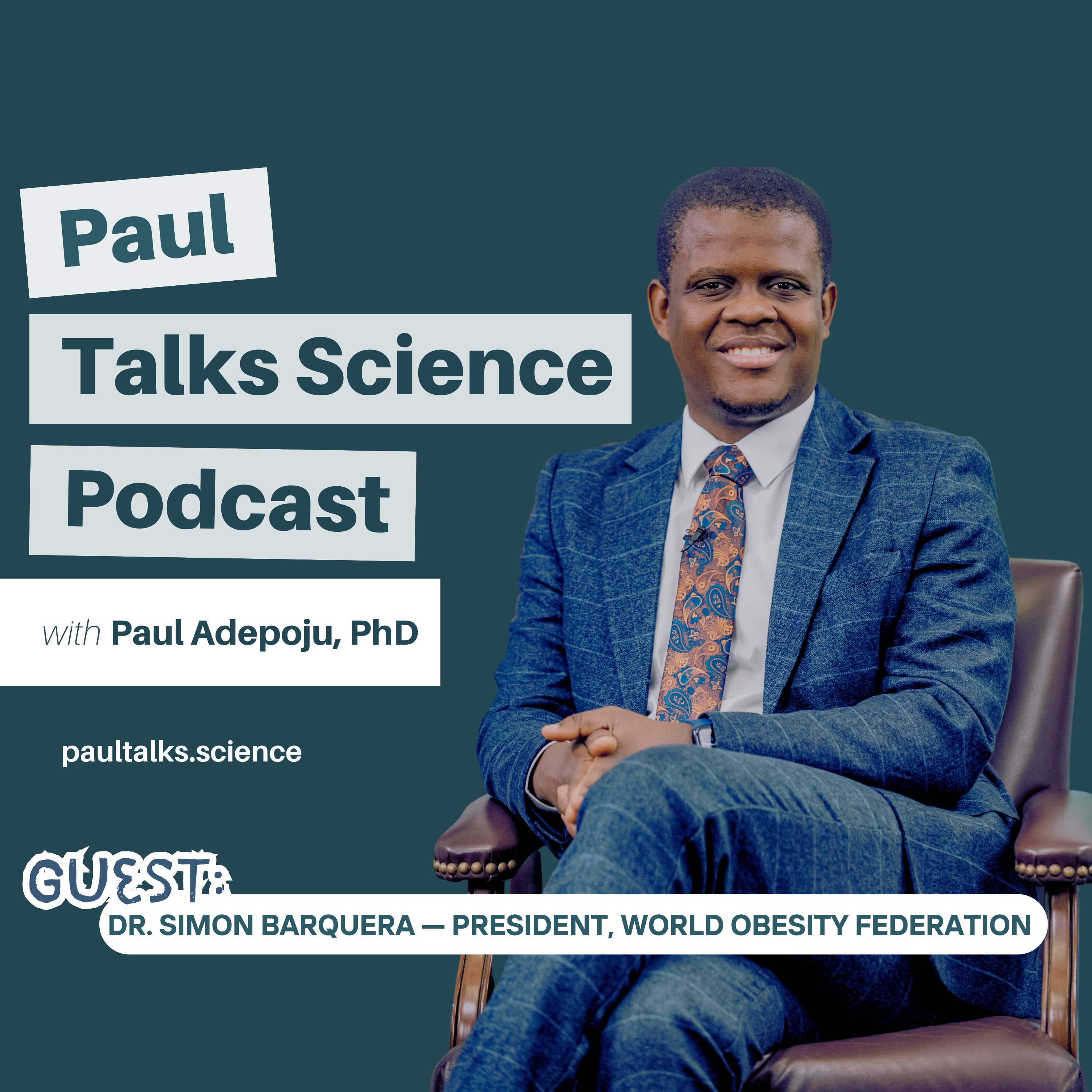
Paul Talks ScienceSystems, Not Choices: Rethinking Obesity’s Root CausesObesity is often framed as a personal failure—but what if the real culprit lies beyond individual choices? In this eye-opening episode of Paul Talks Science, host Paul Adepoju speaks with Dr. Simon Barquera, President of the World Obesity Federation, about the deeper systems fueling the global obesity epidemic. Exploring insights from the latest World Obesity Atlas, they uncover how ultra-processed foods, powerful industry interests, and failing health systems are driving obesity rates upward—especially in low- and middle-income countries.From discussing effective strategies like healthy taxes and clear food labeling to highlighting best practices from countries succ...
2025-03-3139 min
Paul Talks ScienceCan Lifestyle Changes Really Boost Your Cancer Survival?After a cancer diagnosis, many wonder: What can I do to improve my long-term health? In this episode of Paul Talks Science, I sit down with Dr. Helen Croker, Assistant Director of Research and Policy at the World Cancer Research Fund International, to explore the science behind lifestyle choices and cancer survival.We dive into the latest research on diet, physical activity, and weight management—and whether these factors can truly influence life after cancer. Dr. Croker shares key findings from systematic reviews on breast and colorectal cancer, revealing what the evidence supports, what remains uncertain, and th...
2025-03-1715 min
Paul Talks ScienceCancer on the Label, Stigma off the Record: How Ireland is Fighting for SurvivorsIn this episode, we explore Ireland's groundbreaking approach to cancer advocacy through two compelling conversations with leaders from the Irish Cancer Society. CEO Averil Power shares how relentless advocacy led to landmark legislation requiring cancer warnings on alcohol labels, changing Ireland's relationship with alcohol and health. Suzanne Dowd, Advocacy Officer, reveals another front in the fight: erasing financial stigma against cancer survivors struggling to access insurance and financial services long after recovery. Together, their stories illustrate Ireland's bold steps to protect cancer survivors, tackle stigma, and inspire global action.
2025-03-1013 min
Paul Talks ScienceLong Reads, Big Impact: The Next Leap in Rare Disease ResearchIn this episode of Paul Talks Science, I speak with Prof. Christian Gilissen, Professor in Genome Bioinformatics and Head of Bioinformatics at Radboud University Medical Center, about the game-changing potential of long-read sequencing in rare disease diagnosis.We dive into:🔬 How long-read sequencing works and why it matters🧬 Its advantages over traditional short-read sequencing💡 The impact on patient diagnostics and clinical care💰 The challenges of cost and accessibility⚖️ Ethical and regulatory considerationsProf. Gilissen shares insights from his latest research and explains why long-read sequencing could soon become the new standard in geno...
2025-03-0325 min
Paul Talks ScienceGut Feelings: PFAS, Microbiomes, and Kidney DamageIn this insightful episode of Paul Talks Science, host Paul Adepoju, PhD explores the hidden dangers of PFAS chemicals with Hailey Hampson, PhD, a Postdoctoral Fellow at the University of South Carolina and the University of Washington. Hailey, the lead author of a groundbreaking study on PFAS and kidney function, uncovers the complex relationship between these "forever chemicals," gut microbiomes, and chronic kidney disease.Together, they dive into the biological mechanisms behind PFAS toxicity, revealing how these pollutants disrupt gut bacteria and lead to kidney damage. They also discuss the public health implications, challenges in regulating PFAS...
2025-02-2426 min
Paul Talks ScienceForever Chemicals: The Invisible Threat We Can’t IgnorePFAS – the so-called “forever chemicals” – have infiltrated our water, air, food, and even our bodies. But how did we get here, and what can be done? In this episode, Paul Adepoju speaks with Erik Olson, Senior Strategic Director for Health at the Natural Resources Defense Council (NRDC), to unpack the science, politics, and industry influence behind PFAS pollution.From hidden studies and corporate cover-ups to the latest regulatory rollbacks under the new U.S. administration, we explore the ongoing battle to rein in these toxic substances. Erik shares insights from his years in environmental advocacy, his experiences testifyi...
2025-02-1639 min
Paul Talks ScienceHead Hits & Hidden Risks: Unmasking CTE in Ice Hockey and BeyondJoin host Paul Adepoju on Paul Talks Science as he sits down with Dr. Jesse Mez, neurologist and associate professor at Boston University, to dive into the startling connections between ice hockey, repetitive head impacts, and chronic traumatic encephalopathy (CTE). In this eye-opening conversation, they unpack groundbreaking research from BU’s UNITE Brain Bank, revealing how years of play increase risks of this neurodegenerative disease—and why even non-concussive hits matter.Discover why elite hockey players aren’t the only ones at risk, how “enforcer” roles factor into the equation, and what policy changes could make contact sports safer. Dr...
2025-02-1025 min
Paul Talks ScienceCan Your City Make You Healthier? Data Says YesHow much does your environment influence your health? More than you might think. In this episode of Paul Talks Science, I sit down with Dr. Rumi Chunara, Associate Professor and Director of the Center for Health Data Science at NYU, to explore the fascinating intersection of AI, urban design, and public health.
Dr. Chunara’s research leverages Google Street View data, machine learning, and public health insights to reveal how the places we live, walk, and interact with shape our well-being. From uncovering hidden biases in AI-driven urban mapping to rethinking how we define physical activity, this co...
2025-02-0315 min
Paul Talks ScienceWhy Your Postcode Can Determine Your PrognosisDid you know that where you live could impact your cancer survival chances? Despite having a centralized healthcare system, the UK still faces stark inequalities in cancer care—and for many patients, their postcode can be a deciding factor in their prognosis.
In this episode, Paul Adepoju speaks with Suping Ling, an epidemiologist and assistant professor at the London School of Hygiene and Tropical Medicine, about the socioeconomic disparities in cancer survival and the hidden burden of second primary cancers.
🔬 Key topics discussed:
✔️ How deprivation affects cancer survival rates
✔️ The growing concern of second primary cancers in breast cancer survivors
✔️...
2025-01-2715 min
Paul Talks ScienceBrain Fog, Fatigue & The Unfinished Fight Against Long COVIDLong COVID remains one of the biggest medical mysteries of our time, affecting millions worldwide—but how much do we really know about it? In this episode of Paul Talks Science, Dr. Igor J. Koralnik, Chief of Neuro-infectious Disease at Northwestern University, shares insights from his pioneering research on the neurological manifestations of long COVID.
With over 2,800 patients seen at his clinic and international collaborations spanning Nigeria, Colombia, and India, Dr. Koralnik unpacks the real-world impact of brain fog, fatigue, and cognitive dysfunction. We discuss the global disparities in diagnosis and treatment, the challenges of studying a co...
2025-01-2022 min
Paul Talks ScienceBridging Gaps: Macmillan's Path to Equitable Cancer SupportIn this episode of Paul Talks Science, I sit down with Gemma Peters, Chief Executive of Macmillan Cancer Support, on the sidelines of the World Cancer Congress 2024. We delve into Macmillan’s groundbreaking efforts to address inequities in cancer care, exploring how the organization is partnering with communities, fostering innovation, and ensuring that no one is left behind.
From challenges in cancer diagnosis to leveraging technology like AI for marginalized populations, Gemma shares her vision for a more inclusive future in cancer care. Tune in for an inspiring conversation about bridging gaps and reshaping the narrative of ca...
2025-01-0519 min
Paul Talks ScienceShaping Global Cancer Control with Dr. Cary AdamsIn this episode of Paul Talks Science, Dr. Paul Adepoju sits down with Dr. Cary Adams, CEO of the Union for International Cancer Control (UICC), to discuss the transformative role of the World Cancer Congress in global cancer control. They delve into the progress made in cancer prevention, early detection, and treatment over the past decade and explore the challenges of addressing inequities in healthcare systems worldwide.
Dr. Adams shares insights on the importance of implementation science, the need for equity in cancer care, and the role of governments in prioritizing universal health coverage. He also highlights...
2024-12-3019 min
Paul Talks ScienceInside the 2024 World Malaria Report: Progress, Inequities, and Future FrontiersIn this episode of Paul Talks Science, we dive into the insights and challenges presented in the 2024 World Malaria Report. Joining us is Prof. William Moss, Deputy Director of the Johns Hopkins Malaria Research Institute, who sheds light on the progress made in malaria control over the past two decades, the advent of malaria vaccines, and the critical inequities that still need addressing.
We discuss the spread of the urban-friendly Anopheles stephensi mosquito, the challenges of drug and insecticide resistance, and the exciting yet complex future of genetically modified mosquitoes. Prof. Moss also shares lessons learned from...
2024-12-2415 min
Paul Talks ScienceScaling Solutions: Project ECHO’s Global ImpactIn this episode of Paul Talks Science, we explore the transformative impact of Project ECHO, a global initiative that's bridging health inequities by democratizing expertise and empowering underserved communities.
Dr. Sanjeev Arora, founder of Project ECHO, shares the powerful story of how a heartbreaking patient encounter inspired him to create this innovative hub-and-spoke model that’s now helping millions worldwide. We’re also joined by Dr. Daniel Jose Fofi from South Africa, who explains how he’s using Project ECHO to revolutionize cancer care in the Northern Cape, addressing late diagnoses, resource gaps, and access challenges.
This...
2024-12-1639 min
Paul Talks ScienceDecentralizing Diagnostics to Close the Healthcare GapIn this episode of Paul Talks Science, I sit down with Ifeoluwa Dare-Johnson, the inspiring founder and CEO of Healthtracka. Driven by a deeply personal loss, Ifeoluwa shares her journey of transforming grief into action by founding a health tech startup that's revolutionizing diagnostics in Africa. We explore the challenges of tackling non-communicable diseases, the nuances of gender health disparities, and the innovative solutions Healthtracka has developed to decentralize access to healthcare.
One compelling story from our conversation is also featured in Devex. Dive deeper into how Healthtracka and other African health startups are proving that saving...
2024-12-0939 min
Paul Talks ScienceCracking the Code: Prostate Cancer Genomics in AfricaIn this episode of Paul Talks Science, we delve into groundbreaking research led by Dr. Carl Chen, PhD, Medical Scientist and Researcher at the Strengthening Oncology Services Research Unit, Sydney Brenner Institute for Molecular Bioscience, University of the Witwatersrand.
Dr. Chen and his team recently published a landmark study in Nature Genetics titled “Genomic risk loci for prostate cancer in men of African descent” (DOI: 10.1038/s41588-024-01931-3). This largest genome-wide study of prostate cancer in Africa uncovered unique genetic markers that provide critical insights into why men of African descent face higher prostate cancer risks.
2024-12-0240 min
Paul Talks ScienceHealthcare in the Age of MistrustHow is polarization shaping the way we approach healthcare? In this episode of Paul Talks Science, I sit down with Dr. Kai Ruggeri to explore how group affiliations and ideological divides are influencing decisions about vaccines, health guidelines, and public health strategies.
Dr. Ruggeri shares fascinating insights into the role of trusted voices, the global patterns of healthcare mistrust, and how we can rebuild confidence in public health systems.
This episode ties into my recent article for Harvard Public Health—"Political and public health structures are increasingly intertwined". Check it out for a deeper dive in...
2024-11-1813 min
Paul Talks ScienceMothers, Newborns, and InnovationIn this episode of Paul Talks Science, host Paul Adepoju sits down with Michael Moreland, founder of Field, to explore groundbreaking innovations in maternal, newborn, and child healthcare across Africa. They discuss how Field’s tech-driven solutions are helping save lives by optimizing health supply chains, supporting local pharmacies, and enhancing care at the grassroots level. With a recent $11 million commitment from the Gates Foundation, Field is scaling up access to life-saving interventions in regions where maternal mortality rates remain critically high. Tune in to learn how practical, scalable tech is transforming health systems, empowering communities, and redefining the fu...
2024-11-0432 min
Paul Talks ScienceInside the Red Cross's Global Health Strategy: From Emergency Response to Vaccine AdvocacyIn this episode of Paul Talks Science, host Paul Adepoju, PhD, sits down with Paul Cheruiyot, head of programs at the International Federation of Red Cross and Red Crescent Societies (IFRC). Together, they delve into the vital role the Red Cross plays in responding to global health emergencies. From navigating the complexities of COVID-19 vaccine distribution across continents to addressing emerging threats like Monkeypox, the conversation highlights how the Red Cross mobilizes communities, partners with organizations like African CDC and the MasterCard Foundation, and supports public health infrastructure.
Cheruiyot shares insights on how the Red Cross's strategic...
2024-10-2135 min
Paul Talks ScienceViral Threats and Vaccine Breakthroughs: A Deep Dive into MarburgWelcome to the Paul Talks Science podcast. On this episode, I have a timely and important conversation about the race to develop a vaccine for the Marburg virus. Marburg is a rare but deadly viral haemorrhagic fever that has recently emerged in Rwanda, sparking global concern.
Read my interview with the health minister of Rwanda on how the country is controlling the disease. The interview was published by Scientific American, and you can read it here.
You can read an article that I wrote for The Lancet on the Marburg virus vaccine efforts here.
2024-10-1424 min
Paul Talks ScienceEngineering Hope: Tackling Viruses with Gene TherapyIn this insightful episode, host Paul Adepoju, PhD sits down with Professor Patrick Arbuthnot, a leading expert in gene therapy and antiviral research, to explore the transformative potential of gene therapy in addressing Africa's viral health challenges. Patrick shares his fascinating journey from working in Paris to setting up the Antiviral Gene Therapy Research Lab in South Africa, and discusses how gene therapy could revolutionize treatments for hepatitis B, HIV, and other viral diseases across the continent.
Together, they delve into the technological advancements that have made antiviral gene therapy a tangible solution, and why Africa needs...
2024-10-0741 min
Paul Talks ScienceCancer's Hidden Battle: Mental HealthIn this episode of Paul Talks Science, host Paul Adepoju, a seasoned science journalist, sits down with Professor Gozde Ozakinci, Professor and Deputy Dean at the Faculty of Psychology, University of Stirling, UK. Together, they dive into the psychological impact of cancer diagnosis, treatment, and survivorship, exploring the often-overlooked mental health challenges faced by cancer patients and survivors.
Professor Ozakinci shares her extensive research on anxiety, depression, and the fear of cancer recurrence, offering valuable insights into how emotional well-being plays a critical role in cancer recovery. From psycho-oncology to holistic approaches in patient care, this conversation...
2024-09-2833 min
Paul Talks ScienceRethinking Global Health Cooperation for Equitable Access and SupportAfrica's public health landscape is again at the centre of global health attention with a series of actions now in play to stem the spread of mpox. This week, the Africa Centres for Disease Control and Prevention will officially declare mpox a public health emergency of continental concern. This is expected to be historic since this is the first time that the centre would be making such a declaration. Similarly, a closed virtual meeting of the Emergency Committee convened by the WHO Director-General under the International Health Regulations 2005 regarding the upsurge of mpox has been set for Wednesday, 14 August 2024...
2024-08-1243 min
Paul Talks SciencePrecision Medicine for a Healthier FutureIn this episode, we explore how South Africa is leveraging genomic sequencing to tackle some of its most pressing health challenges, from HIV to non-communicable diseases. Our guest, Rizwana Mia, Senior Programme Manager: Strategic Health Innovation Partnerships - NCD/Precision Medicine, shares insights on the country's ambitious plans to develop a 110,000-genome programme, and how this data can unlock the power of precision medicine for their diverse population.
We delve into the delicate balance between personalized care and population-wide public health and discuss the importance of data sharing and responsible research practices to accelerate progress. Discover how...
2024-08-0424 min
Paul Talks ScienceUnlocking Natural Control of HIV without Antiretroviral TherapyAcross the world, some individuals are able to naturally control HIV without requiring antiretroviral therapy, due to the uniqueness of their genetic composition. Several of these individuals have been identified in South Africa which has the world's highest HIV/AIDS burden. Dr Veron Ramsuran, associate professor at the University of KwaZulu-Natal is leading a team that also includes researchers from the South African Medical Research Council (SAMRC) to study this crucial population in South Africa, whose unique genetic makeup could contain the secrets to more effective AIDS prevention tools. The ultimate goal is to develop therapeutic interventions that mimic...
2024-08-0434 min
Paul Talks ScienceThe Potential of Sequencing to Transform Healthcare in AfricaIn this conversation, Paul Adepoju hosts Alukhethi Singo-Ragimana from MGI Tech. They discuss the unique features of MGI's sequencing technology, its applications in HIV genotyping and drug resistance surveillance, and the challenges and solutions in the sequencing ecosystem in Africa. They also talk about MGI's plans for South Africa and its involvement in the Africa-wide genomic initiative. The conversation highlights the affordability and competitiveness of genomic sequencing technologies, the impact of the COVID-19 pandemic on sequencing adoption, and the potential of sequencing to transform healthcare in Africa.
2024-08-0434 min
Paul Talks ScienceTransforming Cancer Care in Nigeria: A Conversation with Dr. Zainab Shinkafi-BaguduIn this episode, we explore a groundbreaking development in Nigeria's healthcare system. The Nigerian government has officially declared cancer a notifiable disease, mandating all public and private healthcare providers to report cancer cases to a centralized registry. This initiative aims to create a comprehensive database that accurately reflects the burden of cancer in Nigeria, enabling better resource allocation, policy formulation, and monitoring of interventions.
Our guest is Her Excellency, Dr. Zainab Shinkafi-Bagudu, a renowned cancer advocate, board member of the Union for International Cancer Control, and founder of the Medicaid Cancer Foundation. She provides valuable insights into...
2024-07-0922 min
Paul Talks ScienceTransforming Cancer Care in New ZealandIn this inaugural episode of "The Future Tense," host Paul Adepoju sits down with Health Minister Dr. Shane Reti and Cancer Society of New Zealand CEO Dr. Rachael Hart to discuss a groundbreaking development in New Zealand's healthcare system. The coalition government has announced a substantial funding boost for cancer treatments, allowing Pharmac, the country's drug-buying agency, to introduce 26 new cancer treatments as part of 54 new medicines.
Dr. Reti and Dr. Hart delve into the details of this transformative initiative, the expected impact on cancer patients, and the broader implications for the healthcare landscape. They also explore...
2024-06-2622 min
Global Health MattersBringing health stories to the front pageIn an age where misinformation and disinformation are valid threats to global health, reliable and trustworthy journalism is essential. In this episode, host Garry Aslanyan speaks with two health journalists who might tell the same story in different ways because of their respective audiences. Stephanie Nolen, the global health reporter for The New York Times, has reported from more than 80 countries around the world. Paul Adepoju is a Nigeria-based freelance health journalist and scientist who regularly reports for top media and science outlets such as Nature, The Lancet, Devex and CNN. He is also the community manager of the G...
2024-03-2635 min
PAUL FOH PODCASTWhere is your money? Oluwatumininu AdepojuHow to increase your sales 3 day sales class: https://iampaulfoh.com/sell-anything-to-anyone/
PROMO: Get my 3 books and 4 webinars for $10: https://paulfoh8.gumroad.com/l/csoku
Join my private whatsapp community: https://app.groupify.co/g/yb8Tqi7iiavV
Get my free actionable sales increase email: https://paulfoh.substack.com/
Veritasi Homes: https://veritasihomes.com/
2023-08-2443 min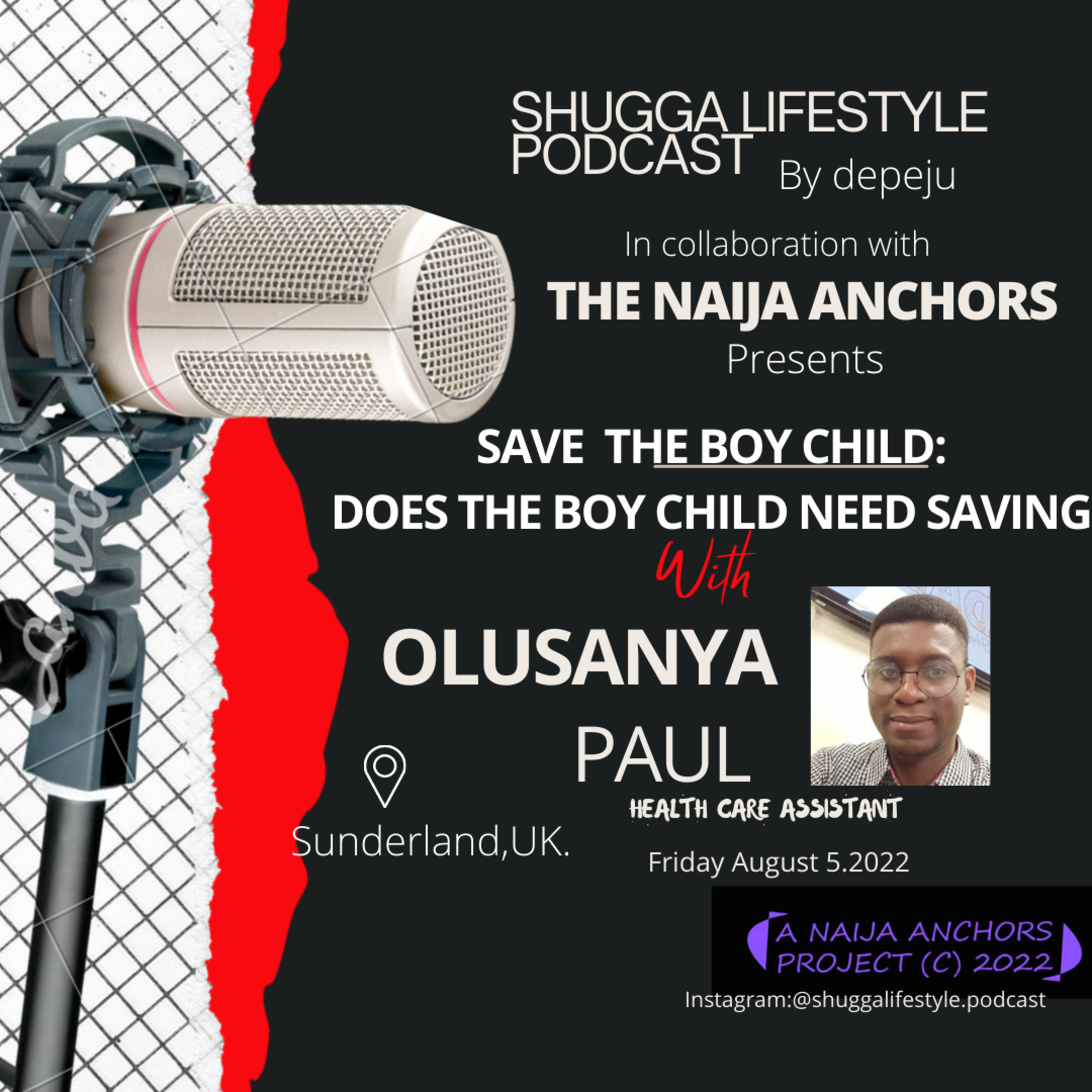
Shugga LifestyleSave the boy child:Does the boy child need saving? With Paul OlusanyaOn this episode of shugga lifestyle Podcast,
Paul will talk to us about saving the boy child.
Today's boys are tomorrow's dad and they are future leaders too. They should not be neglected. This podcast is filled with emotions and passion. Save the boy child: does the boy child need saving?
2022-08-0544 min